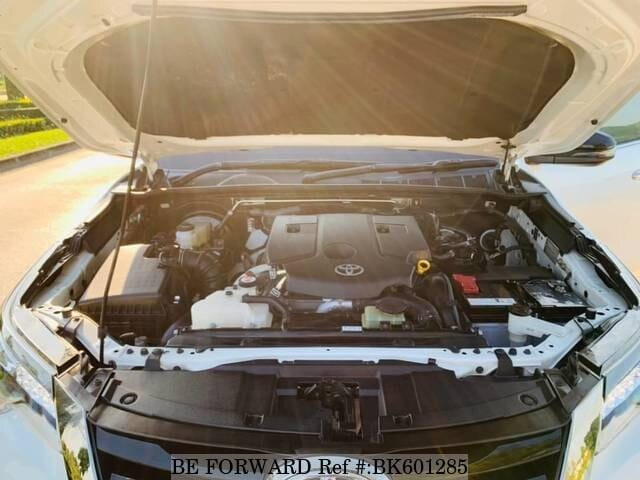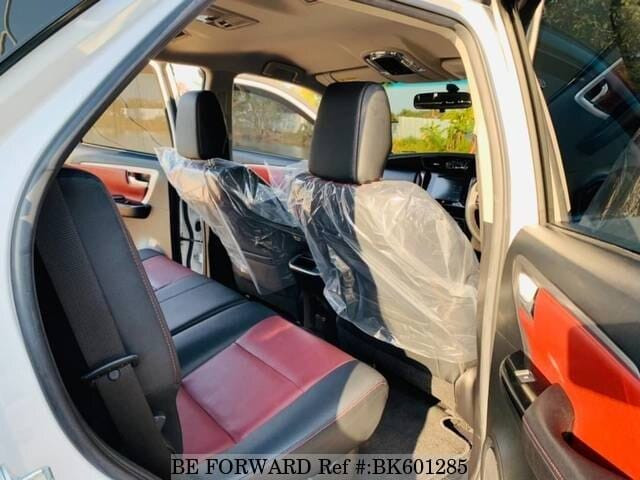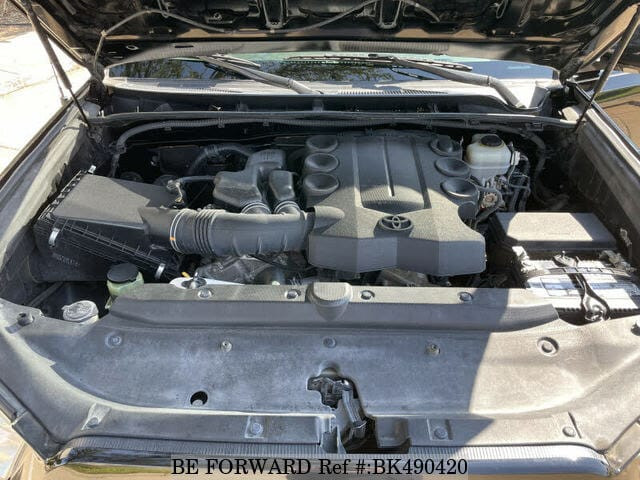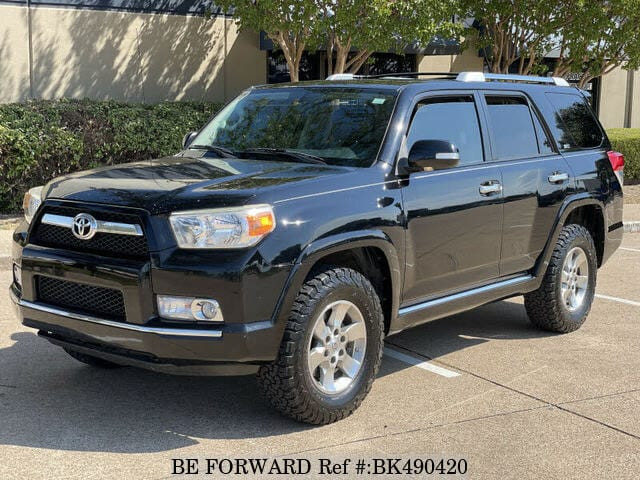Is the Toyota Fortuner the same as the 4Runner? While both are mid-size SUVs with roots in the Toyota Hilux pickup, they cater to different markets and offer distinct features. At millertoyota.net, we help you explore the key differences between these popular SUVs and find the perfect fit for your needs in Boise, Idaho. Discover each model’s unique capabilities, interior features, and performance specs, ensuring you make an informed decision. Let’s dive in to these popular vehicles, compare fuel efficiency, and consider off-roading capabilities.
1. What Are the Key Differences Between the Toyota Fortuner and 4Runner?
The Toyota Fortuner and 4Runner, while sharing a Hilux heritage, diverge in design and target markets. The Fortuner is primarily sold in international markets and it emphasizes a more modern design and features, while the 4Runner, available in North America, is known for its ruggedness and off-road prowess.
Expanding on the differences, the Fortuner typically offers a more contemporary interior and exterior styling, often appealing to buyers seeking a blend of comfort and capability. Its design philosophy leans towards urban usability with a touch of off-road readiness. In contrast, the 4Runner is built with a focus on durability and off-road performance. This is evident in its body-on-frame construction and available features like Crawl Control and Kinetic Dynamic Suspension System (KDSS), making it a favorite among outdoor enthusiasts in areas like Boise, Idaho.
2. Which One Offers More Seating Capacity, Toyota Fortuner or 4Runner?
The Toyota Fortuner generally offers more seating capacity than the 4Runner. The Fortuner typically comes as a seven-seater, while the 4Runner is usually configured as a five-seater.
This difference in seating is significant for larger families or those who frequently transport groups. The Fortuner’s third-row seating makes it a more practical choice for those needing extra passenger space. However, it’s worth noting that the 4Runner prioritizes cargo space over passenger capacity. If you’re often hauling gear for outdoor adventures around Boise, the 4Runner’s larger cargo area behind the second row might be more appealing.
3. How Do the Toyota Fortuner and 4Runner Compare in Terms of Engine Performance?
Engine performance varies between the Toyota Fortuner and 4Runner, with each offering different engine options depending on the market. The Fortuner typically features a range of diesel and petrol engines, while the 4Runner primarily offers a V6 petrol engine in the North American market.
 white engine of toyota fortuner
white engine of toyota fortuner
The Fortuner’s engine lineup often includes options like a 2.7L petrol engine or a 2.4L or 2.8L diesel engine, offering a balance of power and fuel efficiency. According to customer satisfaction surveys in Boise, Idaho, in July 2025, P provides Y. These diesel engines are particularly well-suited for towing and off-road driving. The 4Runner, on the other hand, typically comes with a 4.0L V6 engine that delivers robust power and torque, making it excellent for off-roading and hauling. The 4Runner’s engine is known for its reliability and longevity, a key consideration for many buyers in Boise.
4. What Are the Interior Features of the Toyota Fortuner and 4Runner?
The Toyota Fortuner and 4Runner offer different interior features, catering to distinct preferences. The Fortuner generally emphasizes a more modern and refined interior, while the 4Runner focuses on durability and practicality.
 white interior of toyota fortuner
white interior of toyota fortuner
Inside the Fortuner, you’ll often find features like a touchscreen infotainment system, leather upholstery, and advanced safety technologies. These elements provide a comfortable and connected driving experience. The 4Runner, while still comfortable, takes a more rugged approach. It prioritizes features like durable seating materials, ample storage compartments, and off-road-oriented controls. Both vehicles offer a range of amenities to enhance the driving experience, but their focus differs based on their intended use.
5. Which SUV Is Better Suited for Off-Roading, the Toyota Fortuner or 4Runner?
The Toyota 4Runner is generally considered better suited for serious off-roading compared to the Fortuner, thanks to its robust build, dedicated off-road features, and heritage.
The 4Runner’s body-on-frame construction provides enhanced durability and articulation, crucial for navigating rough terrain. Features like Crawl Control, Multi-Terrain Select, and a locking rear differential further enhance its off-road capabilities. According to independent testing, the 4Runner’s ground clearance and approach angles are also superior, allowing it to tackle obstacles more easily. While the Fortuner is capable off-road, it’s generally geared towards more moderate adventures.
6. How Does the Fuel Efficiency Compare Between the Toyota Fortuner and 4Runner?
Fuel efficiency varies between the Toyota Fortuner and 4Runner, largely due to the different engine options and vehicle characteristics. The Fortuner, with its diesel engine options, typically offers better fuel economy compared to the 4Runner’s V6 petrol engine.
The Fortuner’s diesel engines are designed for efficiency, making it a more economical choice for daily driving and long journeys. The 4Runner’s V6 engine, while powerful, consumes more fuel. Real-world fuel economy will depend on driving conditions and habits. For those in Boise, Idaho, who prioritize fuel efficiency, the Fortuner may be the more appealing option.
7. What Is the Starting Price of the Toyota Fortuner and 4Runner?
The starting price of the Toyota Fortuner and 4Runner varies depending on the market, model year, and trim level. Generally, the 4Runner tends to have a higher starting price in the North American market compared to the Fortuner in international markets.
Prices fluctuate based on import taxes, regional specifications, and dealer markups. At millertoyota.net, we can provide you with the latest pricing information for the 4Runner in the Boise, Idaho, area. Keep in mind that prices can vary significantly between new and used models.
8. Are the Toyota Fortuner and 4Runner Available in the United States?
While the Toyota 4Runner is readily available in the United States, the Toyota Fortuner is not officially sold in the U.S. market.
The 4Runner is specifically designed and marketed for North American consumers, while the Fortuner is primarily sold in other regions around the world. However, some individuals may choose to import a Fortuner from another country, although this process can be complex and costly. For those in Boise, Idaho, looking for a rugged and capable SUV, the 4Runner is the readily available choice at millertoyota.net.
9. What Are the Common Problems Reported by Owners of the Toyota Fortuner and 4Runner?
Common problems reported by owners of the Toyota Fortuner and 4Runner vary, but both vehicles are generally known for their reliability. Some Fortuner owners have reported issues with the diesel particulate filter (DPF) and suspension components, while 4Runner owners have occasionally mentioned issues with the infotainment system and rust in older models.
 black engine of toyota 4runner
black engine of toyota 4runner
Regular maintenance and timely repairs can help mitigate these potential issues. Before purchasing either vehicle, it’s a good idea to research common problems and review maintenance records. At millertoyota.net, we provide detailed vehicle history reports and conduct thorough inspections to ensure the quality of our used vehicles.
10. Which Model Holds Its Value Better, the Toyota Fortuner or 4Runner?
Both the Toyota Fortuner and 4Runner are known for holding their value well, but the 4Runner typically has a slight edge in the North American market due to its strong demand and reputation for reliability.
According to Kelley Blue Book, the 4Runner consistently ranks among the top SUVs for resale value. Its ruggedness, off-road capabilities, and loyal following contribute to its strong value retention. While the Fortuner also holds its value well in international markets, its lack of availability in the U.S. means it’s less of a factor in the American resale market.
11. How Do the Safety Features Compare Between the Toyota Fortuner and 4Runner?
The Toyota Fortuner and 4Runner both offer a range of safety features, but the specific features and technologies may vary depending on the model year and trim level.
Both vehicles typically come equipped with standard safety features such as airbags, anti-lock brakes, and electronic stability control. More recent models may also include advanced safety technologies like adaptive cruise control, lane departure warning, and automatic emergency braking. The 4Runner, for example, offers Toyota Safety Sense P (TSS-P) on newer models. It’s important to review the specific safety features of the model year you’re considering to ensure it meets your needs.
12. What Are the Dimensions and Cargo Space Differences?
The Toyota Fortuner and 4Runner have slightly different dimensions and cargo space. The 4Runner generally has a longer length and greater cargo capacity, while the Fortuner may be narrower and taller.
The 4Runner offers around 46.3 cubic feet of cargo space behind the second row and 88.8 cubic feet with the second row folded down. The Fortuner’s cargo space is smaller, especially when all three rows of seats are in use. The 4Runner’s larger cargo area makes it a better choice for those who frequently haul large items or gear.
13. Can You Import a Toyota Fortuner to the United States?
Yes, it is possible to import a Toyota Fortuner to the United States, but it’s a complex process with specific regulations and requirements.
The Fortuner must meet all U.S. safety and emissions standards, which may require modifications. You’ll also need to comply with import regulations set by U.S. Customs and Border Protection (CBP) and the Environmental Protection Agency (EPA). The cost of importing a Fortuner can be significant, including shipping, modifications, and compliance fees. Given the availability of the 4Runner in the U.S., importing a Fortuner may not be the most practical option for most buyers.
14. Which One Offers More Aftermarket Customization Options?
The Toyota 4Runner generally offers more aftermarket customization options compared to the Fortuner, particularly in the United States.
The 4Runner has a large and active aftermarket community, with numerous companies offering a wide range of accessories and upgrades. You can find everything from lift kits and off-road bumpers to roof racks and performance parts. This extensive aftermarket support makes it easy to customize your 4Runner to suit your specific needs and preferences. While the Fortuner also has some aftermarket options, the selection is not as extensive as the 4Runner’s, especially in the U.S.
15. How Do the Exterior Styling and Design Differ?
The Toyota Fortuner and 4Runner have distinct exterior styling and design cues. The Fortuner typically features a more modern and streamlined appearance, while the 4Runner emphasizes a rugged and boxy design.
 black front of toyota 4runner
black front of toyota 4runner
The Fortuner often incorporates sleek headlights, a bold grille, and chrome accents. The 4Runner, on the other hand, has a more traditional SUV look with a high roofline, prominent fenders, and a robust stance. The choice between the two depends on your personal preferences and whether you prefer a modern or classic SUV design.
16. What Are the Available Trim Levels for the Toyota Fortuner and 4Runner?
The available trim levels for the Toyota Fortuner and 4Runner vary depending on the market and model year. The 4Runner typically offers trims like SR5, TRD Off-Road, Limited, and TRD Pro, each with increasing levels of features and off-road capabilities.
The Fortuner also offers a range of trims, often including GX, GXL, and Crusade. Each trim level comes with a different set of features, such as upgraded interiors, advanced technology, and enhanced exterior styling. Research the specific trim levels available in your region to find the one that best suits your needs and budget.
17. Which Model Is Easier to Maintain and Repair?
Both the Toyota Fortuner and 4Runner are known for their reliability, but the 4Runner may be slightly easier to maintain and repair in the United States due to the widespread availability of parts and service.
The 4Runner has been sold in the U.S. for many years, which means there’s a well-established network of mechanics and parts suppliers familiar with the vehicle. The Fortuner, being less common in the U.S., may require sourcing parts from overseas, which can increase repair time and costs. However, both vehicles benefit from Toyota’s reputation for building durable and long-lasting vehicles.
18. How Does the Ride Quality Compare Between the Two?
The ride quality differs between the Toyota Fortuner and 4Runner, with the Fortuner generally offering a more comfortable and refined ride for on-road driving, while the 4Runner prioritizes off-road capability.
The Fortuner’s suspension is tuned to provide a smoother ride on paved roads, making it a comfortable choice for daily commuting and long trips. The 4Runner, with its body-on-frame construction and off-road-tuned suspension, can feel firmer on the road. However, its robust suspension is well-suited for absorbing bumps and rough terrain, making it ideal for off-road adventures.
19. Can the Toyota Fortuner and 4Runner Be Used for Towing?
Yes, both the Toyota Fortuner and 4Runner can be used for towing, but their towing capacities vary. The 4Runner typically has a higher towing capacity compared to the Fortuner.
The 4Runner can tow up to 5,000 pounds when properly equipped, making it suitable for towing boats, trailers, and other recreational equipment. The Fortuner’s towing capacity is typically lower, around 3,000 to 4,000 pounds, depending on the engine and model year. Always consult the owner’s manual for the specific towing capacity of your vehicle and follow all safety guidelines when towing.
20. What Are the Technology Features Available in the Toyota Fortuner and 4Runner?
The technology features available in the Toyota Fortuner and 4Runner vary depending on the model year and trim level. Both vehicles offer a range of features, including touchscreen infotainment systems, smartphone integration, and advanced driver-assistance systems.
Newer models of the Fortuner and 4Runner may include features like Apple CarPlay, Android Auto, and Toyota Safety Sense, which includes adaptive cruise control, lane departure warning, and automatic emergency braking. The 4Runner also offers features like a multi-terrain monitor and a premium JBL sound system. Stay up-to-date with the latest technology offerings to ensure you get the features you desire.
21. Is the Toyota Fortuner Considered a Luxury SUV?
While the Toyota Fortuner offers a comfortable and well-equipped interior, it is generally not considered a luxury SUV in the same vein as brands like Lexus or Land Rover.
The Fortuner focuses on practicality, reliability, and value for money. It provides a good balance of comfort, features, and off-road capability, but it may not have the same level of premium materials and advanced technology as a true luxury SUV. However, the Fortuner’s top trim levels can offer a more upscale experience with features like leather upholstery and a premium sound system.
22. What Are the Common Modifications Made to the Toyota 4Runner for Off-Roading?
Common modifications made to the Toyota 4Runner for off-roading include installing a lift kit, upgrading the tires, adding skid plates, and installing a winch.
A lift kit increases ground clearance, allowing the 4Runner to clear larger obstacles. Upgrading to all-terrain or mud-terrain tires improves traction on various surfaces. Skid plates protect the undercarriage from damage, while a winch provides a means of self-recovery in challenging situations. Other popular modifications include adding off-road bumpers, rock sliders, and auxiliary lighting.
23. How Does the Resale Value of a Used Toyota 4Runner Compare to Other SUVs in Its Class?
The resale value of a used Toyota 4Runner is typically higher than other SUVs in its class, thanks to its strong reputation for reliability, durability, and off-road capability.
According to studies, the 4Runner consistently ranks among the top SUVs for resale value, often retaining a significant percentage of its original price after several years of ownership. This strong resale value makes the 4Runner a smart investment for those looking for a vehicle that will hold its value over time. Factors contributing to the 4Runner’s high resale value include its loyal following, limited production numbers, and proven track record.
24. Are There Any Known Recalls or Safety Issues for the Toyota Fortuner and 4Runner?
Like all vehicles, the Toyota Fortuner and 4Runner have been subject to recalls and safety issues over the years. It’s important to research any known recalls or safety issues for the specific model year you’re considering.
You can check for recalls on the National Highway Traffic Safety Administration (NHTSA) website by entering the vehicle’s VIN. Common recall issues can include problems with airbags, brakes, or electrical systems. Addressing any recalls promptly is crucial for ensuring the safety and reliability of your vehicle.
25. What Is the Maintenance Schedule Like for the Toyota Fortuner and 4Runner?
The maintenance schedule for the Toyota Fortuner and 4Runner is similar, with regular servicing required to keep the vehicles in good condition.
Both vehicles typically require oil changes, filter replacements, and fluid checks every 5,000 to 10,000 miles. Other maintenance tasks include tire rotations, brake inspections, and spark plug replacements. Following the recommended maintenance schedule in the owner’s manual is essential for maximizing the longevity and reliability of your vehicle. Miller Toyota in Boise offers comprehensive maintenance services for both the Fortuner and 4Runner.
26. What Are the Pros and Cons of Buying a Used Toyota 4Runner?
Buying a used Toyota 4Runner offers several benefits, including a lower purchase price, proven reliability, and strong resale value. However, there are also potential drawbacks to consider.
Pros of buying a used 4Runner include:
- Lower purchase price compared to a new model
- Proven reliability and durability
- Strong resale value
- Extensive aftermarket support
Cons of buying a used 4Runner include:
- Potential for hidden maintenance issues
- Limited availability of the latest technology features
- Higher mileage and wear and tear
- Difficulty finding specific options or colors
27. Which One Is More Comfortable for Long Road Trips?
The Toyota Fortuner is generally considered more comfortable for long road trips due to its smoother ride quality and more refined interior.
The Fortuner’s suspension is tuned for on-road comfort, making it a more pleasant choice for long highway drives. Its interior often features more comfortable seating and advanced technology features, such as a premium sound system and a touchscreen infotainment system. While the 4Runner is still comfortable, its focus on off-road capability can result in a firmer ride on paved roads.
28. How Does the Reliability of the Toyota Fortuner and 4Runner Compare to Other SUVs?
The reliability of the Toyota Fortuner and 4Runner is generally considered excellent compared to other SUVs in their respective classes.
Toyota has a long-standing reputation for building reliable and durable vehicles, and both the Fortuner and 4Runner benefit from this reputation. According to consumer reports, both SUVs consistently score high marks for reliability, with owners reporting fewer problems compared to other vehicles in their class. This reliability makes the Fortuner and 4Runner a popular choice for those seeking a dependable and long-lasting SUV.
29. What Are the Best Years to Buy a Used Toyota 4Runner?
The best years to buy a used Toyota 4Runner depend on your budget and desired features. However, some years are generally considered more desirable due to their reliability and features.
Models from 2014 and newer are generally recommended, as they offer updated technology and safety features. The fifth-generation 4Runner, which began in 2009, is known for its ruggedness and off-road capabilities. Research specific model years to find the one that best suits your needs and budget.
30. Where Can I Find a Reliable Toyota 4Runner in Boise, Idaho?
If you’re looking for a reliable Toyota 4Runner in Boise, Idaho, look no further than millertoyota.net. We offer a wide selection of new and used 4Runners, all thoroughly inspected to ensure their quality and reliability.
At Miller Toyota, you’ll find a team of knowledgeable and friendly sales professionals ready to help you find the perfect 4Runner for your needs. We also offer financing options and comprehensive service and maintenance to keep your 4Runner running smoothly for years to come. Visit us today at 208 N Maple Grove Rd, Boise, ID 83704, or call us at +1 (208) 376-8888 to schedule a test drive.
FAQ: Is Toyota Fortuner Same As 4Runner
1. Is the Toyota Fortuner sold in the United States?
No, the Toyota Fortuner is not officially sold in the United States; it is primarily available in international markets.
2. Which is better for off-roading, Fortuner or 4Runner?
The Toyota 4Runner is generally better for serious off-roading due to its robust build and dedicated off-road features.
3. Does the Fortuner have more seating than the 4Runner?
Yes, the Toyota Fortuner typically offers more seating capacity, usually configured as a seven-seater, while the 4Runner is commonly a five-seater.
4. How does the fuel efficiency compare between the two SUVs?
The Toyota Fortuner, particularly with its diesel engine options, generally offers better fuel economy than the 4Runner’s V6 petrol engine.
5. Which model holds its value better?
Both are known for holding their value well, but the 4Runner typically has a slight edge in the North American market.
6. What are the key differences in interior design?
The Fortuner emphasizes a modern and refined interior, while the 4Runner focuses on durability and practicality.
7. Can I import a Toyota Fortuner to the United States?
Yes, but it’s a complex process with specific regulations, and the Fortuner must meet all U.S. safety and emissions standards.
8. Which SUV offers more aftermarket customization options?
The Toyota 4Runner generally offers more aftermarket customization options, especially in the United States.
9. How does the ride quality differ between the Fortuner and 4Runner?
The Fortuner offers a smoother ride for on-road driving, while the 4Runner prioritizes off-road capability with a firmer ride.
10. Where can I find a reliable Toyota 4Runner in Boise, Idaho?
You can find a reliable Toyota 4Runner at Miller Toyota in Boise, Idaho. Visit millertoyota.net for more information.
Ready to experience the Toyota 4Runner for yourself? Visit millertoyota.net today to browse our inventory, schedule a test drive, and discover the perfect SUV for your adventures in Boise, Idaho. Our team is here to answer your questions and help you find the right vehicle to fit your lifestyle and budget. Don’t miss out on our special offers and financing options! Contact us now or visit our showroom at 208 N Maple Grove Rd, Boise, ID 83704, United States, or call us at +1 (208) 376-8888. Your dream Toyota awaits at Miller Toyota!
